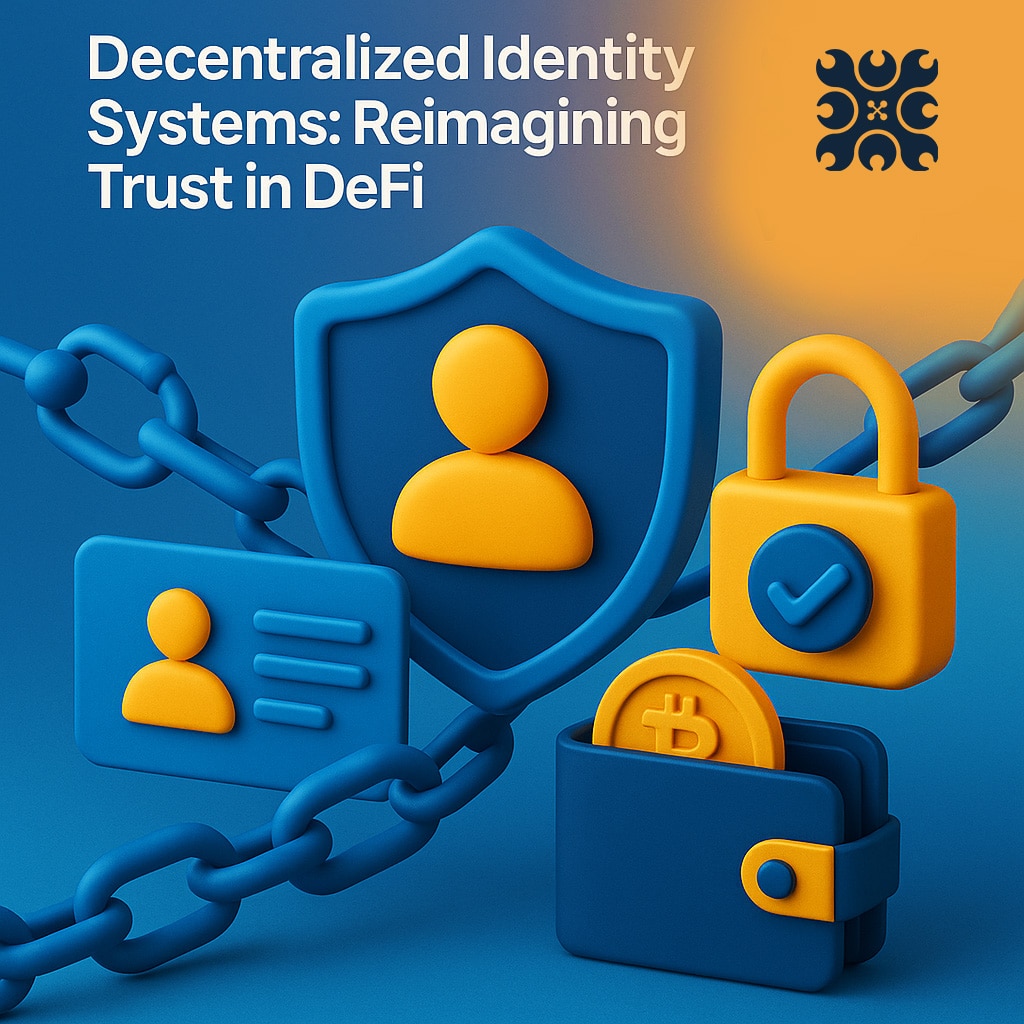Decentralized Identity Systems: Reimagining Trust in DeFi
Richmond Oppong
May 12, 2025

Introduction
As decentralized finance (DeFi) continues to evolve, one challenge persists: how can users verify who they are or prove their trustworthiness without relying on traditional institutions? That is where Decentralized Identity (DID) systems come in. Decentralized Identity systems are a powerful innovation designed to bring security, privacy, and self-sovereignty to the forefront of Web3.
In 2025, decentralized identity is no longer just a concept. It’s becoming a core layer of the DeFi stack, enabling safer, more inclusive participation in blockchain ecosystems.
What is Decentralized Identity?
Decentralized identity is a framework that allows individuals to own, manage, and share their personal information without depending on a central authority. Instead of usernames, passwords, and third-party verification systems, DIDs use blockchain-based credentials that are:
- User-controlled
- Cryptographically secured
- Verifiable on-chain or off-chain
- Interoperable across platforms and apps
With DIDs, users can prove who they are (or aspects of their reputation) without revealing unnecessary personal data.
Why It Matters in DeFi
DeFi is built on openness and hidden identities, but this also brings some problems:
- Sybil attacks, where users exploit systems with multiple wallets
- Rug pulls and scams from anonymous bad actors
- Limited access to services (like loans or governance) without trust signals
DID systems solve these by enabling verifiable credentials such as proof of creditworthiness, KYC status, or voting history without compromising privacy.
How It Works
- Identity Wallets: Users store their decentralized identifiers and verifiable credentials in an identity wallet (like MetaMask Snap, Disco, or SpruceID).
- Issuers and Verifiers: Trusted entities (e.g. universities, banks, DAOs) can issue credentials, and any app or platform can verify them without relying on a central database.
- Zero-Knowledge Proofs (ZKPs): These allow users to prove something (e.g., “I’m over 18” or “I’ve repaid a loan”) without revealing any underlying data.
This framework allows for privacy-preserving trust, which is essential for DeFi to scale responsibly.
Real-World Applications in 2025
- On-chain Credit Scores: Platforms like Spectral and Reputation DAO are developing DID-powered credit systems to offer undercollateralized loans.
- DAO Governance: Communities are using decentralized reputation systems to ensure only active, trustworthy users can vote on critical decisions.
- DeFi Compliance: DIDs allow platforms to meet KYC/AML requirements without centralized data storage, unlocking DeFi–TradFi interoperability.
Web3 Social: Decentralized social apps like Lens Protocol and CyberConnect use identity layers to link content, relationships, and reputation across platforms.
Benefits of DID in DeFi
- User Sovereignty: Users own and control their identity without being tracked or surveilled.
- Improved Security: No centralized honeypots of user data to hack.
- Enhanced Reputation Systems: Allows for trust-based systems without requiring real-world identity exposure.
- Access and Inclusion: Individuals in underserved regions can now build identity and reputation without needing a bank or government ID.
Challenges Ahead
While promising, decentralized identity still faces hurdles:
- Lack of Standards: Competing DID frameworks can hinder interoperability.
- Regulatory Uncertainty: Governments are still catching up to blockchain-based identity.
- Adoption Barriers: User onboarding and education remain complex.
Still, with initiatives from the Decentralized Identity Foundation and W3C, momentum is building toward unified, user-centric identity systems.
Conclusion
Decentralized identity systems are laying the groundwork for a more secure, private, and human-centered DeFi ecosystem. As these tools mature, they will redefine not just how we transact, but how we prove who we are and who we can trust in the digital world.
In the next phase of Web3, your wallet won’t just hold your tokens, it will hold your identity.
References
- SoluLab. (2025). Top DeFi Trends You Should Know in 2025. Retrieved from https://www.linkedin.com/pulse/top-defi-trends-you-should-know-2025-solulab-lsurc
- Cointelegraph. (2024). Decentralized Identity and the Future of DeFi. Retrieved from https://cointelegraph.com
- Decentralized Identity Foundation. (2025). Projects and Standards. Retrieved from https://identity.foundation
- World Economic Forum. (2023). Digital Identity: Advancing Inclusive and Trusted Identity Systems. Retrieved from https://www.weforum.org
Spectral Finance. (2025). On-Chain Credit Scores for Web3 Lending. Retrieved from https://spectral.finance
The Future of Blockchain in Supply Chains
Feel Free To Contact Us
Wada plan to collaborate with trusted local and international electronic and print media outlets to inform the public about decentralized applications to accelerate adoption.
- hello@wada.org
